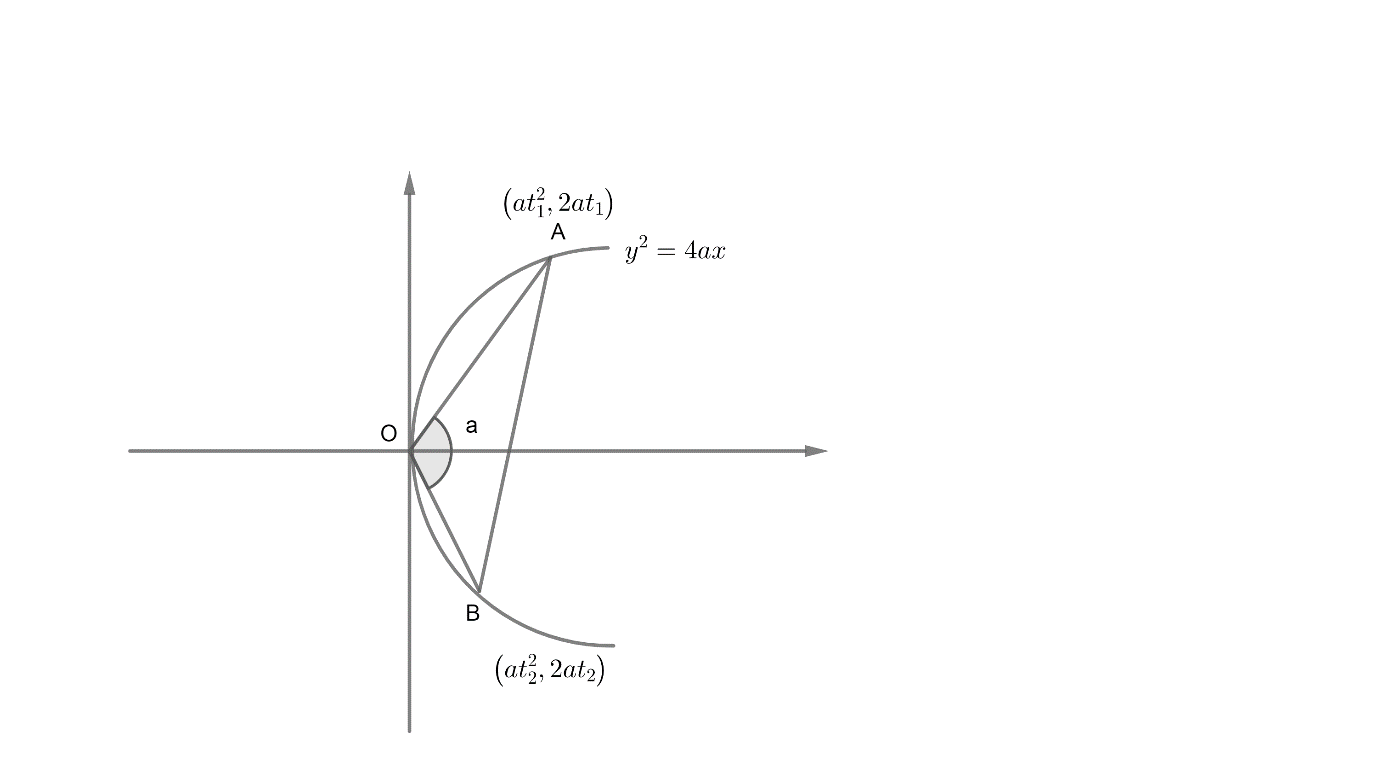Question
Question: Show that the locus of the poles of chords which subtend a constant angle a at the vertex is the cur...
Show that the locus of the poles of chords which subtend a constant angle a at the vertex is the curve,
(x+4a)2=4cot2a(y2−4ax)
If the constant angle be a right angle the locus is a straight line perpendicular to the axis.
Solution
This question can be solved by writing the equation of the chord joining two points on the parabola and using the formula of angle subtended by a chord on its vertex.
On the parabola y2=4ax, a point can be assumed having coordinates (at2,2at) where ‘t’ is a parameter.
Complete step-by-step answer:
Let us assume two points on a parabola y2=4ax A(at12,2at1) and B(at22,2at2).
The equation of chord joining points (at12,2at1) and (at22,2at2) has the equation,
(y−2at2)=at22−at122at2−2at1×(x−at22)
Equation of a line joining two points (x1,y1) and (x2,y2) is (y−y1)=(x2−x1y2−y1)(x−x1).
So, equation of the line joining A(at12,2at1) and B(at22,2at2).
(y−2at2)=at22−at122at2−2at1×(x−at22)⇒(y−2at2)=a(t2−t1)(t2+t1)2a(t2−t1)×(x−at22)⇒(y−2at2)=t2+t12×(x−at22)⇒(y−2at2)(t2+t1)=2(x−at22)

Given the chord subtends angle ‘a’ at the vertex.
Angle between two lines is,
tana=1+m1m2m1−m2where m1=slope of line OAm2=slope of line OB
Slope of line passing through points (x1,y1) and (x2,y2)=x2−x1y2−y1
Slope of OA=at12−02at12−0=t12=m1Slope of OB=at22−02at22−0=t22=m2
Comparing the equation yk=2ax+2ah with the equation of the chord, we have,
kt1+t2=2a2=2ah2at1t2...........(2)
From this equation,
⇒h=at1t2 andk=a(t1+t2)
From equation (1) and (2),
t1t2=ah and (t1+t2)=akFormula:(a+b)2−(a−b)2=4ab(t1+t2)2−(t1−t2)2=4t1t2⇒a2k2−a4h=(t1−t2)
Equation (1) becomes,
2a2k2−a4h=tana×(4+ah)
On squaring both sides,
⇒4(a2k2−a4h)=tan2a(ah+4)2⇒4(a2k2−4ah)=tan2a(ah+4a)2⇒a24(k2−4ah)=tan2aa2(h+4a)2⇒4(k2−4ah)=tan2a(h+4a)2
On replacing ‘h’ with ‘x’ and ‘k’ with ‘y’,
4(y2−4ax)=tan2a(x+4a)2⇒(x+4a)2=tan2a4(y2−4ax)⇒(x+4a)2=4cot2a(y2−4ax)
Hence, the required locus is: (x+4a)2=4cot2a(y2−4ax)
If the constant angle is 90∘, then
tana=tan90∘=Not defined⇒cot90∘=0
So, the locus will be (x+4a)2=0
⇒x+4a=0⇒x=−4a
This is a line perpendicular to the axis.
Hence, the locus will be a straight line perpendicular to the axis when the constant angle will be a right angle.
Note: This is a simple question in which we have to assume points on parabola in parametric form and obtain relation between the parameters from the given information in the question. Be careful while writing the parametric forms and solving the equations.
